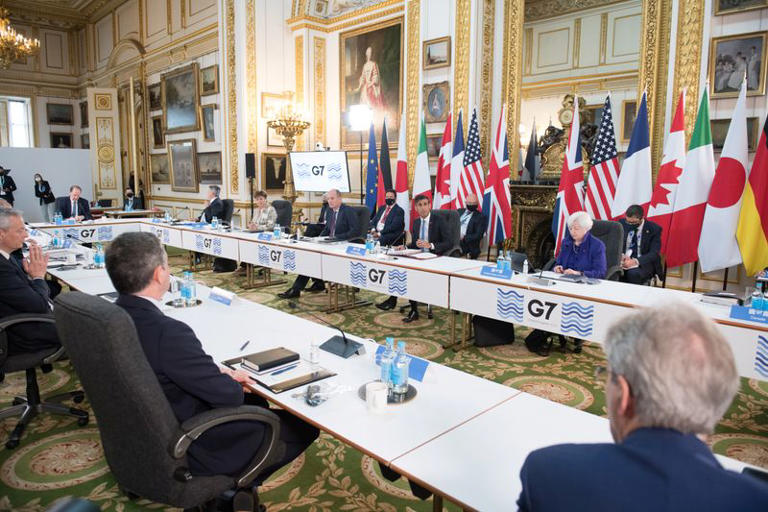
G7 finance ministers and central bankers will meet in Italy this week to discuss how to utilize frozen Russian assets to aid Ukraine’s war efforts and address China’s increasing export power in key markets. The G7, consisting of the United States, Japan, Germany, France, Britain, Italy, and Canada, will convene in the northern Italian town of Stresa on Friday and Saturday. Negotiations have been ongoing for several weeks on how to effectively utilize approximately $300 billion worth of Russian financial assets, including major currencies and government bonds, which were frozen following Russia’s invasion of Ukraine in February 2022.
The United States is actively working on finding a solution to expedite the future income from Ukraine’s assets. This could be achieved through the issuance of a bond or, more likely, by granting Ukraine a loan. The loan is expected to provide Ukraine with a substantial amount, potentially reaching $50 billion in the near future.
However, there are various legal and technical matters that need to be resolved. As a result, it is unlikely that a detailed agreement will be reached during the Stresa meeting. Instead, informal discussions will continue with the aim of presenting a proposal to the heads of government from the G7 countries, who will convene in Puglia, southern Italy, on June 13-15.
The idea of the G7 issuing a bond for Ukraine seems to have lost traction, as the United States is now proposing a loan that would be supported by the income generated from the frozen assets. However, there are still several questions that need to be addressed, such as who would administer the loan (e.g. the World Bank or another organization), how the loan would be guaranteed, how future profits can be estimated, and what would happen in the event of a peace agreement with Russia.
European officials are proceeding with caution, as one EU diplomat stated that it would take a significant amount of time, possibly weeks or even months, before a final decision is reached.
The use of Russian assets, as proposed by the United States, has raised concerns about its legal implications. Italy, currently holding the G7 presidency, expressed that these implications need further clarification.
Japanese Finance Minister Shunichi Suzuki emphasized the importance of any agreement complying with international law.
Russia has consistently warned the West of potential consequences if its assets are interfered with, accusing the United States of pressuring Europe to take more drastic measures against Russia in the Ukraine conflict.
In addition to these concerns, global trade prospects will also be a major focus in Stresa, as the United States recently announced significant tariff increases on various Chinese imports, including electric vehicle batteries, computer chips, and medical products.
Giorgetti expressed concern about the ongoing “trade war” and its connection to geopolitical tensions, warning of potential disruptions to global trade.
While the United States is not calling for its partners to take similar actions against China, officials suggest that they may seek to address Beijing’s industrial “overcapacity” in the G7 communique.
During a visit to Frankfurt, U.S. Treasury Secretary Janet Yellen emphasized the need for the United States and Europe to collaboratively address the threat of Chinese imports in order to support manufacturers on both sides of the Atlantic and promote domestic clean energy industries.
The official agenda for the Stresa meeting, as outlined by the Italian presidency, also includes discussions on the impact of artificial intelligence on the global economy and an evaluation of sanctions against Russia.
In Stresa, taxation will be a key topic of discussion. Italy aims to revive the global minimum tax agreement for multinational companies, which was signed by approximately 140 countries in 2021 but has faced opposition in the United States and elsewhere, hindering its full implementation.
Furthermore, the proposal for a global wealth tax targeting billionaires, supported by countries like Brazil and France within the Group of 20 developed nations, will also be on the agenda. However, this proposal is facing resistance from the United States, according to an official.